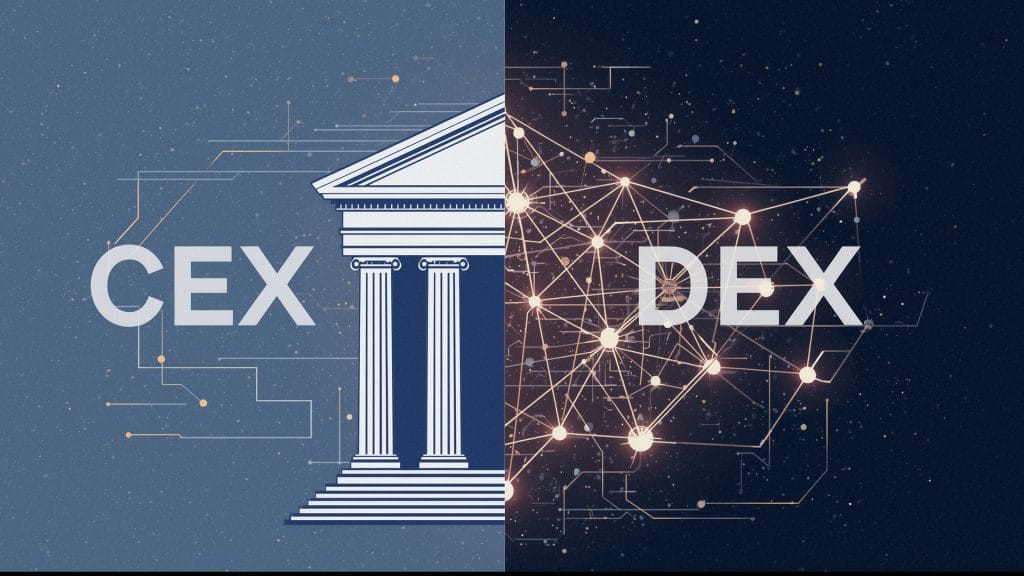Exchanges & Wallets
Centralized vs. Decentralized Exchanges (CEX vs. DEX): Key Differences

Once you’ve decided to buy, sell, or trade cryptocurrency, you’ll face a fundamental choice: where will you conduct these transactions? This decision will lead you to two distinct types of platforms that operate on entirely different principles: Centralized Exchanges (CEXs) and Decentralized Exchanges (DEXs).
To a beginner, these acronyms might sound overly technical, but the difference between them is crucial and has significant implications for your security, control over your funds, and overall user experience.
This guide will break down the key differences between CEXs and DEXs in simple, easy-to-understand terms, helping you understand the pros and cons of each.
What is a Centralized Exchange (CEX)?
A centralized exchange (CEX) is the most common entry point for newcomers to crypto. Think of a CEX like a traditional stock exchange or a digital bank. It is a company that acts as a trusted third party to facilitate the buying and selling of digital assets.
These platforms are “centralized” because a single corporate entity owns, operates, and controls them. They manage order books, match buyers with sellers, and, most importantly, hold custody of users’ funds in their own wallets.
How It Works
Users deposit their funds—either fiat currency (like USD, EUR) or cryptocurrency—into an account on the exchange. When you trade on a CEX, you are not directly interacting with the blockchain. Instead, you are trading within the company’s private, internal database. This process is fast, efficient, and familiar to anyone who has used an online brokerage account.
Key Characteristics of a CEX
- Custodial: The exchange holds your private keys and controls your crypto on your behalf. This is a direct contrast to the crypto mantra of “not your keys, not your crypto.”
- Requires KYC: To comply with global anti-money laundering (AML) regulations, most CEXs require users to complete a Know Your Customer (KYC) process, which involves submitting personal identification documents.
- User-Friendly: CEXs typically offer simple, intuitive interfaces, dedicated customer support, and easy “on-ramps” for converting fiat money into crypto.
- High Liquidity & Speed: Because they attract a large number of users, CEXs generally have high liquidity, meaning it’s easy to find a buyer or seller for an asset at a stable price. Trades are executed almost instantly.
What is a Decentralized Exchange (DEX)?
A decentralized exchange (DEX) operates on a completely different philosophy. Think of a DEX like a peer-to-peer marketplace that runs without an intermediary. Instead of a central company, a DEX is powered by smart contracts—self-executing code that runs on a blockchain.
These platforms are “decentralized” because they are not owned or operated by a single entity. They are automated protocols that allow users to trade directly with one another.
How It Works
On a DEX, you never deposit your funds into an exchange-controlled account. Instead, you trade directly from your own personal, non-custodial wallet (like MetaMask or Trust Wallet). You connect your wallet to the DEX, and the smart contracts facilitate the swap between assets. At all times, your funds and private keys remain in your control.
Key Characteristics of a DEX
- Non-Custodial: You are always in full control of your private keys and your funds.
- Permissionless & Often Anonymous: Most DEXs do not require a KYC process. Anyone with a crypto wallet can access and use them without needing to provide personal information.
- Censorship-Resistant: Since there is no central company, there is no single entity that can freeze your funds, block your trades, or be shut down by regulators.
- Potential for Lower Liquidity & On-Chain Costs: While growing rapidly, some assets on DEXs may have lower liquidity than on major CEXs. All trades are subject to blockchain transaction fees (gas fees), which can be high during times of network congestion.
CEX vs. DEX: A Head-to-Head Comparison
| Feature | Centralized Exchange (CEX) | Decentralized Exchange (DEX) |
| Control of Funds | The exchange holds your keys (Custodial) | You hold your own keys (Non-Custodial) |
| Security | Company is a major target for hackers. | User is responsible for their own security; smart contract vulnerabilities are a risk. |
| Anonymity | Requires personal ID (KYC) | No personal ID required (Anonymous) |
| Ease of Use | Generally easier for beginners, with customer support. | Requires more technical knowledge (managing wallets, gas fees). |
| Asset Availability | Lists well-established, vetted assets. | Offers a vast range of new and niche tokens. |
| Fees | Fixed trading fees set by the company. | Variable “gas fees” paid to the blockchain network. |
Which One is Right for You?
The choice between a CEX and a DEX depends entirely on your priorities and comfort level with the technology.
- A CEX might be suitable for you if: You are a beginner, value convenience and high speed, need customer support, and want an easy way to convert traditional currency into crypto.
- A DEX might be suitable for you if: You prioritize self-custody and full control over your funds, value privacy and anonymity, and want to access a wider variety of new and emerging tokens.
Conclusion: Two Different Philosophies
Ultimately, CEXs and DEXs are not just different platforms; they represent two different philosophies. Centralized exchanges offer a bridge to the traditional financial world, providing a familiar and convenient experience at the cost of giving up custody of your assets. Decentralized exchanges embody the core principles of crypto—self-sovereignty, privacy, and decentralization—at the cost of requiring more personal responsibility from the user.
Many experienced users leverage both: they use a CEX as an on-ramp to buy crypto with fiat and then move their assets to a DEX and personal wallets to trade and interact with the wider DeFi ecosystem. Understanding the trade-offs between them is a key step in becoming a more knowledgeable and secure cryptocurrency user.
